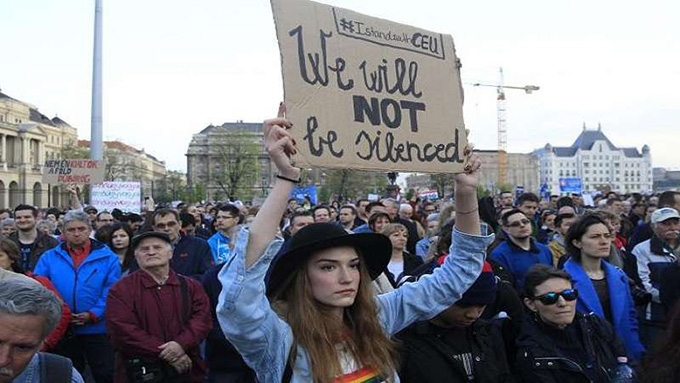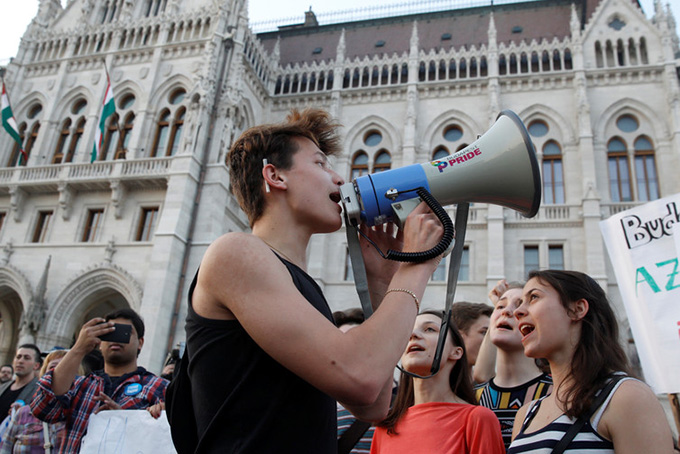
In recent weeks, tensions over European immigration and liberal values have culminated in a direct attack on the Central European University in Budapest.
The university is now facing closure after a series of questionable higher education “reforms” by the Hungarian government.
CEU’s founder and patron – the Hungarian-born billionaire and philanthropist George Soros – has been at the centre of these attacks. This is after Hungary became the epicentre of the European refugee and migrant crisis back in 2015.
During this time, CEU offered scholarships to Syrian citizens, opened language classes and made available career development training to refugees registered in Hungary funded by a prestigious EU Erasmus Plus grant.
The Hungarian government, on the other hand, erected a fence of steel along Hungary’s southern border – intended to keep out refugees attempting entry from Serbia. Other countries followed suit and fence building became the new normal.
Culture War
Since then, the country’s prime minister, Viktor Orban, has expressed contempt for what he likes to call “the Soros University”.
Orban’s rejection of the policies of the German chancellor, Angela Merkel, regarding refugees has been channelled into vocal anger at Central European University’s support for refugees.
According to the German publication Deutsche Welle, Orban believes that Muslim immigrants are a destructive force against Europe’s Christian values and culture. And he has previously said that organisations linked to George Soros are systematically “organising” mass migration.
The new normal?
It is important to understand these latest attacks on CEU not as an internal political battle specific to Hungary, but as part of a broader anti-liberal agenda. This is an agenda that sees the European Union as a cultural battlefield between “liberals” and “illiberals”.
The Financial Times has even asserted that we are in the midst of a fully fledged “culture war”. And one of the most significant outcomes of this war to date is that it has become possible to expressly oppose mass migration into Europe – while remaining independent of traditional “far right” politics.
This battle between “liberalism” and “illiberalism” has replaced the traditional opposition in politics of “left” and “right”.
Anti-liberalism today encompasses mainstream centrist politics and commands serious clout in European national elections. It also extends across and beyond the former communist countries and combines powerfully anticommunist, pro-capitalist, anti-corporate and anti-liberal messages.
In the words of Hungary’s Orban, it wants to build “globally competitive” states “free from Western European dogma and ideology”, with “Let’s Stop Brussels” forming the basis of his latest national referendum campaign. By Western dogma, Orban means liberalism.
Illiberal democracy
In times of growing economic hardship, anti-liberalism claims to offer a solid system of values to compensate for the lack of wealth and prosperity that European nations were supposed to inherit after the end of the Cold War with accession to the European Union.
Today, in the aftermath of the 2008 banking crisis, many Europeans have given up on liberal democracy as a guarantor of social security and upward mobility. Indeed, Orban has notoriously described his vision of a future Hungary as an “illiberal democracy” based on:
Systems which are non-Western, non-liberal, which are not liberal democracies, perhaps which are not even democracies.“
Orban was thinking here of states such as Singapore, China, India, Russia and Turkey.

In Orban’s world, Brussels, Europe and other enemies of freedom are not those opposed to liberalism, but those who impose liberalism. Reuters.
CEU is currently in a battle for survival in a hostile political climate. In its armoury are the positive political concepts of “liberal democracy” and “human rights”.
But political concepts can only succeed in transmitting a positive message when there is a consensus as to what constitutes a positive social outcome. Liberal “freedoms” and “human rights” have no appeal within an illiberal framework, as the author John Marsh outlined in his book The Liberal Delusion. Liberalism merely encompasses an awkward choice between different kinds of freedom that “illiberals” do not identify with.
It is clear, then, that the attempt to shut down CEU contains abundant lessons on the diverse cultural movements gaining ground across Europe today – in the name of “illiberalism”.
And while CEU is undoubtedly a bastion of liberal values in an illiberal climate, its threatened closure must also be understood as a rallying cry for those who have come to regard liberalism as a repressive ideology imposed from outside and to be resisted at all costs.
Author Bio: Allaine Cerwonka is Dean of the School of Social Sciences at the University of East London This article was coauthored with Anna Loutfi, Assistant Professor at the Central European University, specialising in 19th century legal history and European nation formation, gender studies, and science studies until 2014.

